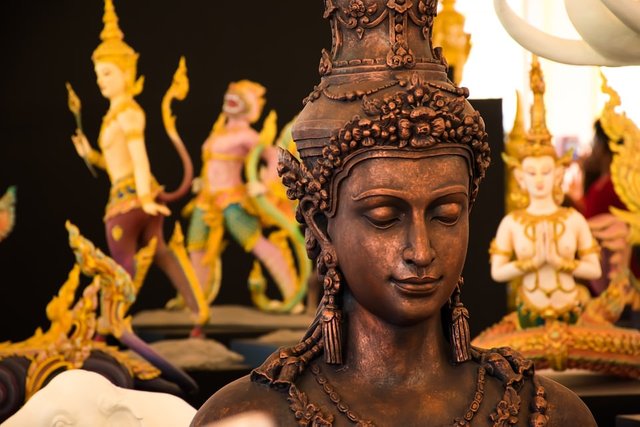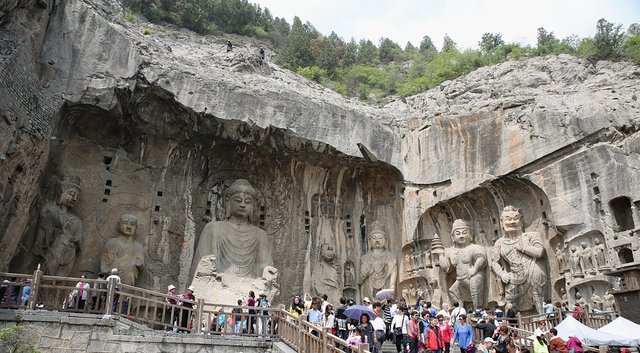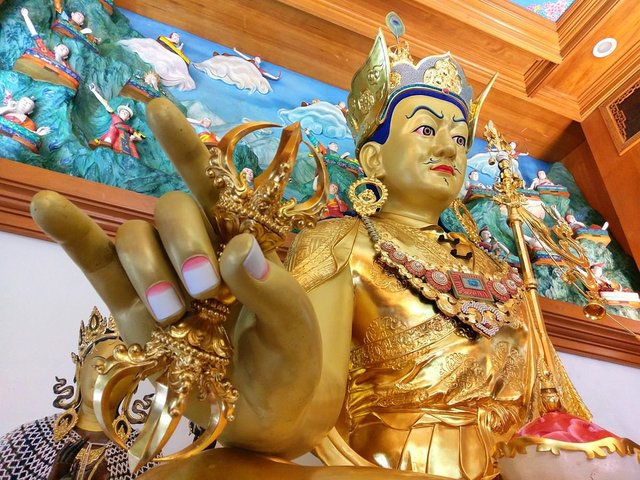
Preface
The following is a short essay written for my Spring 2018 Asian philosophy course. The paper assumes the reader will have a basic understanding of the tenants of Buddhism and some of the philosophical underpinnings thereof. I've focused on the differences between Buddhism's three largest branches and, to that end, have ignored that which differentiates Buddhism from other religions and philosophies. If my readers would like such a paper, I encourage them to comment below.
Slight adjustments have been made aid the flow of the article. Rights free images have been added for the reader's pleasure.
Mahāyāna, Theravāda, and Vájrayāna Buddhism
In Sanatana Dharma, different philosophies lead to differing emphases on the importance of knowledge, devotion, and action (jñāna, bhakti, karma). Similarly, different philosophies within Buddhism have led to three major branches, with emphases on wisdom, compassion, and activity. Respectively, these are Theravāda, Mahāyāna, and Vájrayāna Buddhism.
Theravāda
Theravāda is Pali for “Doctrine of the Elders.” As such, they see themselves as continuing the intent of Buddha as recorded in the Pali Canon. For them, Buddha is a real model—a sage or teacher-saint whose wisdom gives practitioners the hope and guidance needed to become enlightened. They have no need to supplicate or petition a higher power.

To overgeneralize from a Western worldview, Theravādins can be seen as agnostic Deists. They needn’t bother to venture into cosmogenesis. Their time is better spent correcting mistakes, particularly mistakes in thinking. They become rarefied through the evaporation of their ignorance. They idealize the Arhat—the “perfected disciple” who, in order to cross the river of ignorance, “follows the Buddha’s design for a sturdy craft” and then builds it on their own.
For Theravādins, Buddhism is full time. Devotees join the monastic order to dedicate their time to purification and understanding. This separates them from lay society save for their interactions via mendicancy. This self-isolation marries well with their emphasis on individual understanding and resolve. It is the individual who has made the mistake, so it is the individual who must cease the mistake. They do not ignore compassion, but argue that compassion is the inevitable result of right thinking. Still, as stated in Dhammapada verse 165, “No one saves us but ourselves. No one can, and no one may.”
Mahāyāna
Mahāyāna on the other hand has faith in grace. This is exemplified by the Bodhisattva of Compassion, Avalokiteshvara (Sanskrit) aka Kwan Yin (Chinese) aka Kannon (Japanese). While Theravādins admire the Arhat, Mahāyānists idealize those who put off nirvāṇa—the extinguishing of the confines of the self —until first helping all others attain it. These Bodhisattvas are akin to someone who, in a burning theatre, ushers everyone to safety before themselves escaping. However, where a hero is brave in spite of fear, Boddhisattvas have untethered themselves from fears.
We can see the glorification of compassion throughout Mahāyāna. For example, because meditation is said to bring great power, we should first temper ourselves with compassion. Only then, they say, will the power be effective. This leads their clergy to serve the laity, a practice which mirrors their view of Buddha as savior. The Buddha—having already reached nirvāṇa—universally draws all things nearer him because all things are interconnected. The fate of one is connected to the fate of all.

Mahāyāna, Sanskrit for “the Great Vehicle,” is, then, a Buddhism of and for the masses. And, since the laity are not experts on texts, this accounts for a Buddhism which includes devotion and prayer as well as allowing for any degree of theism and a variety of cosmogonies. According to Smith, this makes Mahāyāna “a module that could be grafted onto civilizations whose social foundations were securely in place.”
Because they believe Buddha taught more by example than through his words, Mahāyānists accept scriptures outside the Pali Canon. This is why so many Buddhist terms have both Pali and Sanskrit versions.
Vájrayāna
Vájrayāna Buddhism includes also tantric texts. They say by utilizing all our latent energies, humans can achieve nirvāṇa in a single lifetime. They do this through a disciplined practice of kinesthetic hand movements, mudras, vocalization patterns, mantras, and hypnotizing imagery, mandalas. These allow a group of practitioners to fall into harmonization of sight, sound, and action. Concurrently, they visualize and work toward merger with the specific entity whose powers and virtues they seek to obtain.

Vájrayāna is so named for the vájra practitioners use during meditation. This object symbolizes the potency of lightening as well as the durable strength and clarity of a diamond. Thus, this branch of Buddhism is known as the “Diamond Thunderbolt Vehicle”
Info & quotes via Huston Smith's The World's Religions © 1991
Images via Pixabay CC0 Creative Commons. Free for commercial use.
@incognitoct suggested I share the referral links to the crypto sites I use. I have tried several and these two are my favorites. Enjoy!

I use Binance to exchange digital currencies.
They list more coins than I can count, including STEEM!

I use Coinbase to exchange digital & fiat currencies.
Quickly & easily send ETH, BTC, LTC, or BCH to your USD bank account or credit union without wiring.
Please use the "academic" tag for projects & papers you would submit at the collegiate level. I think it's a good addition to SteemSTEM articles as well as being applicable to the humanities.
Feel free to offer suggestions for improving the article below—whether simply grammatical errors or factual misrepresentations.
Downvoting a post can decrease pending rewards and make it less visible. Common reasons:
Submit
Hi there, nice to see someone talking about spirituality who's actually read some of the texts on here. I've done a lot of both eastern and western philosophy during my undergrad. How did you make out on the paper?
Downvoting a post can decrease pending rewards and make it less visible. Common reasons:
Submit
Aced it! ✌😄
Personally I thought it needed more work, but the prof said it was one of the higher level ones in the class. I thought it was a bit sophomoric, but it was a "take home test" so he told us not to write too much.
I'm on my way out, but I'll def check out your page later.
Downvoting a post can decrease pending rewards and make it less visible. Common reasons:
Submit
When I took asian philosophy over half the class dropped the class by the end because they couldn't get it. For a one page summary I thought you did pretty good. I wouldn't say that the Boddhisatvas are limited to mahayana buddhism but other than that it was cool. If you check out my page most of my recent stuff is economics related but the earlier blogs have some vedanta related content. I was mostly beta testing to see where interests would be on here and people are more receptive to the more recent postings.
Downvoting a post can decrease pending rewards and make it less visible. Common reasons:
Submit
I see. Perhaps you and I can generate more interest in Eastern philosophy and spirituality via our posts 😅
Downvoting a post can decrease pending rewards and make it less visible. Common reasons:
Submit
Your Post Has Been Featured on @Resteemable!
Feature any Steemit post using resteemit.com!
How It Works:
1. Take Any Steemit URL
2. Erase
https://3. Type
reGet Featured Instantly & Featured Posts are voted every 2.4hrs
Join the Curation Team Here | Vote Resteemable for Witness
Downvoting a post can decrease pending rewards and make it less visible. Common reasons:
Submit
Resteemed by @resteembot! Good Luck!
Curious? Read @resteembot's introduction post
Check out the great posts I already resteemed.
ResteemBot's Maker is Looking for Work
Downvoting a post can decrease pending rewards and make it less visible. Common reasons:
Submit
Resteemed by @resteembot! Good Luck!
Curious? Read @resteembot's introduction post
Check out the great posts I already resteemed.
ResteemBot's Maker is Looking for Work
Downvoting a post can decrease pending rewards and make it less visible. Common reasons:
Submit
Resteemed by @resteembot! Good Luck!
Curious? Read @resteembot's introduction post
Check out the great posts I already resteemed.
ResteemBot's Maker is Looking for Work
Downvoting a post can decrease pending rewards and make it less visible. Common reasons:
Submit
Resteemed by @resteembot! Good Luck!
Curious? Read @resteembot's introduction post
Check out the great posts I already resteemed.
ResteemBot's Maker is Looking for Work
Downvoting a post can decrease pending rewards and make it less visible. Common reasons:
Submit
Resteemed by @resteembot! Good Luck!
Curious? Read @resteembot's introduction post
Check out the great posts I already resteemed.
ResteemBot's Maker is Looking for Work
Downvoting a post can decrease pending rewards and make it less visible. Common reasons:
Submit
Why is this happening?
Downvoting a post can decrease pending rewards and make it less visible. Common reasons:
Submit
There is a problem with the data comming from the Steem nodes.
The bot receives data about the same transactions multiple times. What is worse - these repeating data comes with different timestamps, so the bot can not destinguish between 2 transfers that are similar and 1 transfer repeated 2 times.
A fix is on the way.
Please don't be angry about the bot's mishaps in the meantime.
Downvoting a post can decrease pending rewards and make it less visible. Common reasons:
Submit
Thanks for visiting my blog.
Follow @zero12345
Downvoting a post can decrease pending rewards and make it less visible. Common reasons:
Submit